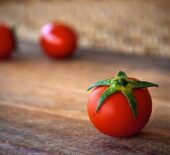How high is your blood pressure? If you are thinking that this reading is not important I have some bad news. High blood pressure means your heart needs to work above a healthy level to pump your blood around your body. This, over the long term can lead to unwanted results like a heart attack.
If you have been diagnosed with high blood pressure or you just want to make sure your blood pressure stays within the healthy range, here are a few manageable things you can choose in your diet:
Firstly, it is important to know normal blood pressure is equal or less than 120/80. The top number is called systolic blood pressure. This is the pressure made from your heart when it contracts and pushes the blood out of your heart. The bottom number is called diastolic blood pressure or the blood pressure that happens when your heart relaxes.
If either of these numbers increase above the normal range it can be considered that you have high blood pressure. The good news is lifestyle choices play a huge role in blood pressure and you can lower your blood pressure by following these tips:
- Fall in Love with Fruits and Vegetables
There are so many benefits to including enough servings of fruit and vegetables into your diet, one of them is these two food groups helps to lower your blood pressure. Fruit and vegetables have lots of potassium which helps to lower your blood pressure. Potassium works in opposite ways to sodium, which brings me to point 2.
- Fall Out of Love with Salt
When you have a high salt meal and it is processed through your bloodstream the sodium attracts fluid into your cell walls. This means inside the blood cells wall your body has more pressure as there is more blood volume. This forces your heart to have to work harder to pump blood around your body.
So where can you find high salt foods? There is the obvious on chips and pretzels but you may not know that there salt in so many different foods, especially processed foods. One of the most common foods with higher salt levels can be found in breads and cereal products. What you can do is choose to limit or eliminate any table salt or added salt to you cooking and when choosing processed foods try to choose products with 120mg of sodium per 100g or less and if this is not possible 400mg or lower is still considered good.
- Dairy and Wholegrains
Go for the low fat dairy over the full fat, all fats are not the same and saturated fat found in animal products is not blood pressure’s friend. Try cutting the fat from any meat you eat or even swapping a few red meat days for legumes like kidney beans (baked beans count) or fish. Fish is a great source of polyunsaturated fats called omega-3 which are heart healthy. When it comes to sugar, added sugar not only makes your blood sugar levels go on a roller coaster but keeps your blood pressure on the top of the ride.
Try to enjoy wholegrain cereal products like brown rice, wholegrain bread, brown pasta, quinoa, couscous over the white varieties. The fibre in the wholegrain foods and legumes and beans are the key component in helping reduce blood pressure.
- Decrease or Limit Your Alcohol
Alcohol is enjoyed by many and it still can be, if enjoyed in moderation. This means no more than 1 standard drink a day for women and 2 standard drinks a day for men. On those special occasions to do no long term damage to your liver no more than 4 standard drinks should pass your lips. No more than 10 standard drinks a week are recommended.
A good habit is to have a few alcohol free days a week as well, there are other ways to relax and wind down other than reaching for the drink. Try a calming walk to a nice park or the lake near your house, practice some meditation or have a warm relaxing bath using incense.
- Smart Snacking!
Nuts and seeds make a great snack. These beauties are high in protein and fibre which help keep you feeling fuller for longer, maintain a healthy weight and they taste great! You can add seeds and nuts to salads, stir fry with vegetables or even add to bread. A serving of nuts is 30g which is roughly a small handful. Portion control is important as even though these foods are really good for your body they are also high in energy and like most things in life, moderation is best.
- Move It Move It!
Be active for at least 30 minutes a day or 60 minutes if you are trying to lose weight. Exercise helps your mind and body feel healthy as well as assists in lowering your cholesterol. Fat which is stored around your belly, also called central adiposity is the most dangerous for your health. This fat around your organs means the body needs to work harder to pump blood around your body and is not only unattractive, hence the name ‘beer gut’, but is pushing your body, potentially, into an early grave.
- Take a Chill Pill
Stress is a natural response from the body and has its place like in emergency situations. The bad news is long term this constant stress can make your heart feel like it is running away from a lion all the time. No heart will last very long functioning this way. If you feel like your work environment is making you stressed try adding something relaxing to your environment, a plant can help add some calm to an environment or a relaxing photograph.
Other helpful tips could be making sure you take lunch and actually stop working during this time. Try going for a walk to unwind the mind or listening to some music which helps you reset. Work life balance is vital for health and you don’t want to be one of those people who live to work rather than work to live.
Take Home Message: Having high blood pressure doesn’t have to be a death sentence. You have so much power over your lifestyle choices. By swapping a few things around in your diet and lifestyle you can keep your body running in a healthy way for a long time to come.
Interested in more? Check out the DASH diet and the Mediterranean diet. These diets have strong evidence to support the health of your heart and may be something you want to know about.
References:
- Appel LJ, Moore TJ, Obarzanek E, Vollmer WM, Svetkey LP, Sacks FM, et al. Dietary patterns and blood pressure. DASH Collaborative Research Group. N Eng J Med.1997 Apr 17;337:637-8. Abstract available from: https://www.ncbi.nlm.nih.gov/pubmed/9099655
- Elmer PJ, Obarzanek E, Vollmer WM, Simons-Morton D, Stevens VJ, Young DR, et al; PREMIER Collaborative Research Group. Effects of comprehensive lifestyle modification on diet, weight, physical fitness, and blood pressure control: 18-month results of a randomized trial. Ann Intern Med. 2006 Apr 4;144(7):485-95. Abstract available from: https://www.ncbi.nlm.nih.gov/pubmed/16585662
- Streppel MT, Arends LR, van't Veer P, Grobbee DE, Geleijnse JM. Dietary fiber and blood pressure - a meta-analysis of randomized placebo-controlled trials. Arch Intern Med. 2005 Jan 24;165(2):150-6. Abstract available from: https://www.ncbi.nlm.nih.gov/pubmed/15668359
- Eckel RH, Jakicic JM, Ard JD, de Jesus JM, Houston Miller N, Hubbard VS, et al. 2013 AHA/ACC guideline on lifestyle management to reduce cardiovascular risk: a report of the American College of Cardiology/American Heart Association Task Force on Practice Guidelines. Circulation. 2014 Jun 24;129(25 Suppl 2):S76-99. doi: 10.1161/01.cir.0000437740.48606.d1. Citation available from: https://www.ncbi.nlm.nih.gov/pubmed/24222015
- Scientific Advisory Committee on Nutrition. Carbohydrates and health. 2015 [cited 2015 Oct 5]. Available from: https://www.gov.uk/government/publications/sacn-carbohydrates-and-health-report








